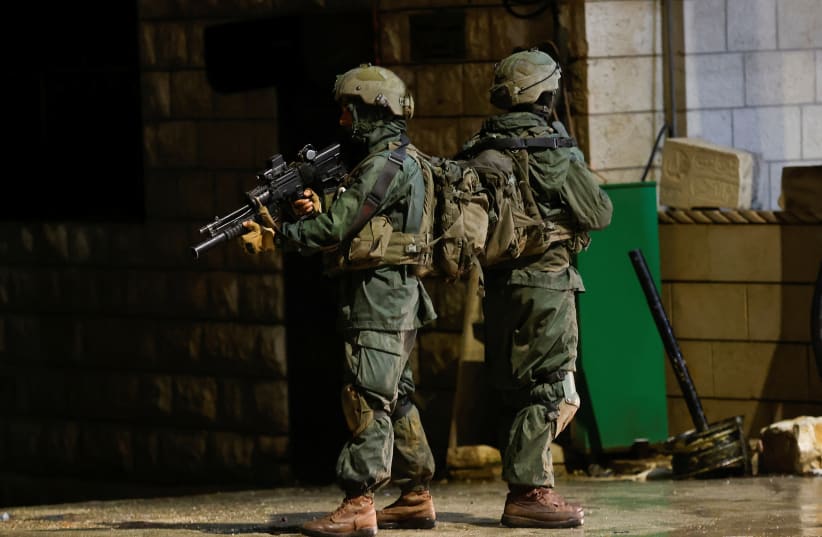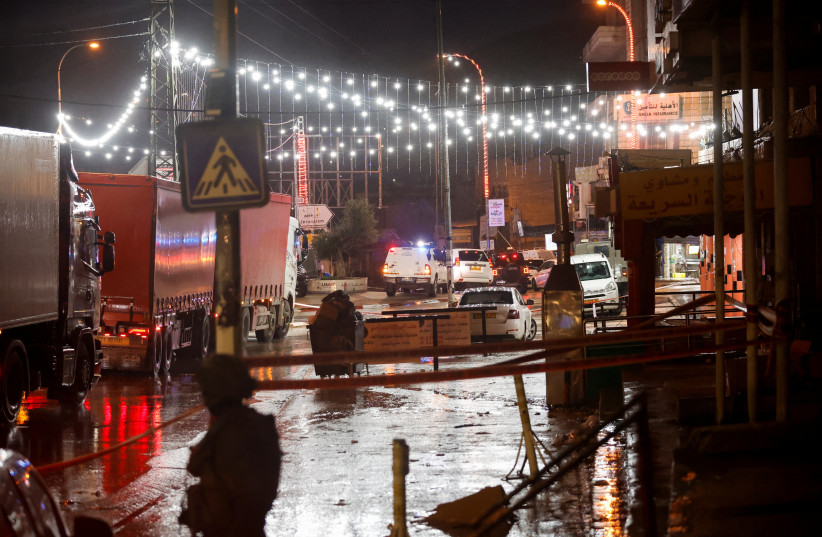In the age of lone wolf terrorists, it is unclear whether Israeli security forces can stop Palestinian terrorists from attacking Jews driving through Huwara, but after two recent terror attacks, one on Sunday, the IDF is certainly trying hard in a number of ways, The Jerusalem Post has learned.
The IDF’s view is that the two terror attacks in Huwara, despite seeming like a pattern specific to the village, should be viewed in the broader context of the ongoing year-old clash, as attacks are not limited to the northern-Samaria Palestinian town. An attack on Tel Aviv’s Dizengoff Street took place last week as well.
The IDF further recognizes that lone wolf terrorists present unique difficulties: They have easy access to weapons and there are usually little or no warnings of their intentions.
How can Huwara terrorist attacks be stopped?
The Post has learned that there was only one moment of exposure before the Sunday Huwara terrorist took the weapon out of his jacket, and that he had no criminal record or reason to be on the radar of security services; so far, there is no evidence to the contrary that he decided to carry out the attack on a whim that day.
None of the characteristics of a terror cell exist here; there’s no trail to follow. The Post understands that security forces could speculate that the terrorist may have had access to the weapon he used for the attack for years. This is in contrast to terror groups who can be tracked when acquiring new weapons.
Huwara was a very tense and dangerous prior to the recent attacks; thousands of Israelis and Palestinians pass through there every day.
The most significant long term security fix, the Post has learned, will be to build a new bypass road in cooperation with the government so that Israeli Jews will not need to go through there to travel between Jewish settlements and sovereign Israel. However, that road is likely to take at least 18 months to two years.
In the short term, the IDF elevated its forces from three battalions to seven after the first attack – the murder of the Yaniv brothers.
Subsequently, it removed two of the reinforcement battalions, but kept one around Huwara and redistributed the forces in a more meticulous way.
As things currently stand, every IDF position in the Huwara area is within the line of sight of the next IDF position.
Yet even with the backup, it remains very hard to stop a lone wolf from attacking someone if they only expose their weapon a moment before attacking in a public space.
If not for the increased reinforcements and wide distribution of IDF forces, the terrorist might have escaped completely, instead of being quickly tracked by the IDF, or at least been able to remain on the run, necessitating even more resources for a manhunt.
The streets in Huwara have heavy traffic which is operationally challenging. Security forces and the government are working to reduce traffic jams until the bypass road is built.
It is important that security forces are also working on improving intelligence surveillance for the village and its surroundings; both terrorists who attacked in Huwara actually arrived there from Nablus.
This means that reinforcing Huwara would not necessarily have caught the terrorists. The IDF has increased the intensity of its security checks for those leaving Nablus as well as surveillance of certain cars and persons in the adjacent areas who arouse suspicion.
Moreover, the IDF has been conducting nightly raids to arrest potential attackers for nearly a year now. It is unclear how long it will maintain them at this pace and whether reinforcement battalions will remain in the Huwara area.
Further, it is unclear what is actually being done to reduce tensions. The village was also hit by a massive arson attack by Jewish settlers after the first attack. Dozens of Palestinians were injured, one later died from injuries and dozens of residences and cars were burned.
State Department deputy spokesperson Vedant Patel tweeted at the time, “We strongly condemn today’s terrorist shooting of a US-Israeli citizen in the West Bank village of Huwara that resulted in serious injuries... We will continue to work with Israelis, Palestinians and our regional partners towards restoring calm.”
“We strongly condemn today’s terrorist shooting of a US-Israeli citizen in the West Bank village of Huwara that resulted in serious injuries... We will continue to work with Israelis, Palestinians and our regional partners towards restoring calm.”
Vedant Patel
Meanwhile, with concerns about increased terrorism in the wider West Bank over the month of Ramadan, the Coordinator of Government Activities in the Territories (COGAT) announced on Monday that Palestinian women of all ages, children up to the age of 12 and men ages 55 and over, will be allowed to enter Jerusalem and al-Aqsa Mosque without need for a permit. Palestinian men aged 45 to 55 will be able to enter if they get a permit, subject to security approval.
Palestinians will also be able to visit their family in Israeli territory and abroad if they receive permits subject to security approval.
Palestinians living in the West Bank will be able to book tickets on designated flights from Ramon Airport during Ramadan and the hours of operation at a number of crossings in the West Bank will be extended.
COGAT will also provide a limited quota of permits for visits by Palestinians from the Gaza Strip to Jerusalem from Sunday-Thursday through Ramadan for women aged 50 and over and for men aged 55 and over.
Omri Nahmias contributed to this story.

